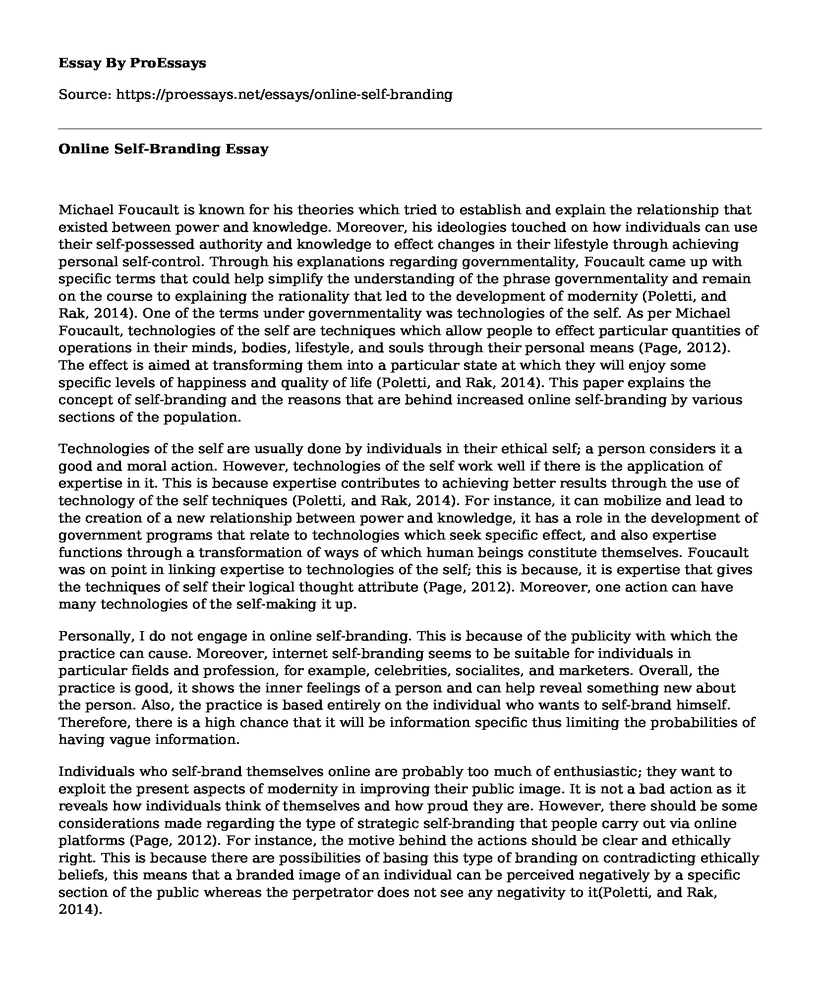Michael Foucault is known for his theories which tried to establish and explain the relationship that existed between power and knowledge. Moreover, his ideologies touched on how individuals can use their self-possessed authority and knowledge to effect changes in their lifestyle through achieving personal self-control. Through his explanations regarding governmentality, Foucault came up with specific terms that could help simplify the understanding of the phrase governmentality and remain on the course to explaining the rationality that led to the development of modernity (Poletti, and Rak, 2014). One of the terms under governmentality was technologies of the self. As per Michael Foucault, technologies of the self are techniques which allow people to effect particular quantities of operations in their minds, bodies, lifestyle, and souls through their personal means (Page, 2012). The effect is aimed at transforming them into a particular state at which they will enjoy some specific levels of happiness and quality of life (Poletti, and Rak, 2014). This paper explains the concept of self-branding and the reasons that are behind increased online self-branding by various sections of the population.
Technologies of the self are usually done by individuals in their ethical self; a person considers it a good and moral action. However, technologies of the self work well if there is the application of expertise in it. This is because expertise contributes to achieving better results through the use of technology of the self techniques (Poletti, and Rak, 2014). For instance, it can mobilize and lead to the creation of a new relationship between power and knowledge, it has a role in the development of government programs that relate to technologies which seek specific effect, and also expertise functions through a transformation of ways of which human beings constitute themselves. Foucault was on point in linking expertise to technologies of the self; this is because, it is expertise that gives the techniques of self their logical thought attribute (Page, 2012). Moreover, one action can have many technologies of the self-making it up.
Personally, I do not engage in online self-branding. This is because of the publicity with which the practice can cause. Moreover, internet self-branding seems to be suitable for individuals in particular fields and profession, for example, celebrities, socialites, and marketers. Overall, the practice is good, it shows the inner feelings of a person and can help reveal something new about the person. Also, the practice is based entirely on the individual who wants to self-brand himself. Therefore, there is a high chance that it will be information specific thus limiting the probabilities of having vague information.
Individuals who self-brand themselves online are probably too much of enthusiastic; they want to exploit the present aspects of modernity in improving their public image. It is not a bad action as it reveals how individuals think of themselves and how proud they are. However, there should be some considerations made regarding the type of strategic self-branding that people carry out via online platforms (Page, 2012). For instance, the motive behind the actions should be clear and ethically right. This is because there are possibilities of basing this type of branding on contradicting ethically beliefs, this means that a branded image of an individual can be perceived negatively by a specific section of the public whereas the perpetrator does not see any negativity to it(Poletti, and Rak, 2014).
In conclusion, self-branding is an aspect of the technology of the self. It involves personal advertisement of how one is. Therefore, only particular information can be used to form an online strategic self-branded post. However, it is important to remain socially responsible and ethical in doing it so as to avoid causing mixed reactions about the brands made.
References
Page, R. (2012). The linguistics of self-branding and micro-celebrity in Twitter: The role of hashtags. Discourse & Communication, 6(2), 181-201.
Poletti, A., & Rak, J. (2014). Identity technologies: Constructing the self online. University of Wisconsin Pres.
Cite this page
Online Self-Branding. (2021, Mar 14). Retrieved from https://proessays.net/essays/online-self-branding
If you are the original author of this essay and no longer wish to have it published on the ProEssays website, please click below to request its removal:
- Fake News Discussion
- The Magazine Cover for Teen Vogue Essay
- Crossing the Farther Shore Essay Example
- Documentary Analysis Essay on Ellis Island
- Essay Sample on Maximizing Employees for Organizational Success
- Caravaggio: Pioneering Artist of Intense Passion and Controversy - Essay Sample
- Paper Example on E-Commerce: Revolutionizing Small Businesses Efficiency







